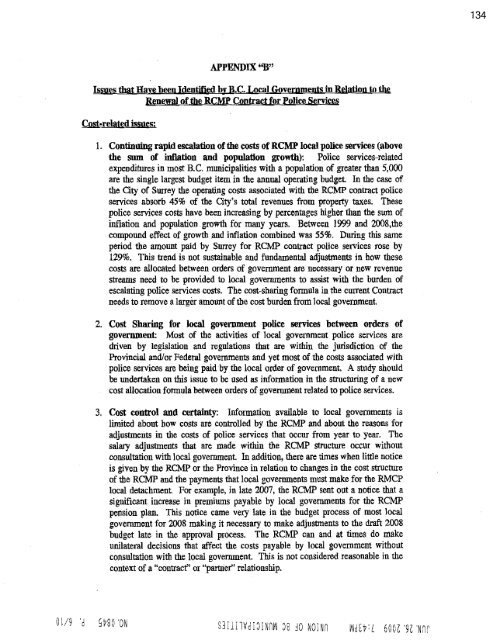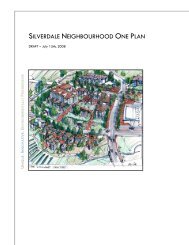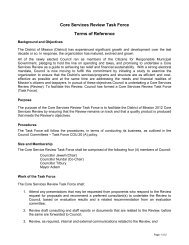July 6, 2009 - District of Mission
July 6, 2009 - District of Mission
July 6, 2009 - District of Mission
- No tags were found...
Create successful ePaper yourself
Turn your PDF publications into a flip-book with our unique Google optimized e-Paper software.
134APPENDIX "B"Ha ee en !ii•I IRenewal_ <strong>of</strong> thE RCMP Contract for Police ServicestipCog.-relatgd issues:I. Continuing rapid escalation <strong>of</strong> the costs <strong>of</strong> RCMP local police services (abovethe sum <strong>of</strong> inflation and population growth): Police services -relatedexpenditures in most B.C. municipalities with a population <strong>of</strong> greater than 5,000are the single largest budget item in the annual operating budget. In the case <strong>of</strong>the City <strong>of</strong> Surrey the operating costs associated with the RCMP contract policeservices absorb 45% <strong>of</strong> the City's total revenues from property taxes. Thesepolice services costs have been increasing by percentages higher than the sum <strong>of</strong>inflation and population growth for many years. Between 1999 and 2008,thecompound effect <strong>of</strong> growth and inflation combined was 55%. During this sameperiod the amount paid by Surrey for RCMP contract police services rose by129%. This trend is not sustainable and fundamental adjustments in how thesecosts are allocated between orders <strong>of</strong> government are necessary or new revenuestreams need to be provided to local governments to assist with the burden <strong>of</strong>escalating police services costs. The cost-sharing formula in the current Contractneeds to remove a larger amount <strong>of</strong> the cost burden from local government.2. Cost Sharing for local government police services between orders <strong>of</strong>government: Most <strong>of</strong> the activities <strong>of</strong> local government police services aredriven by legislation and regulations that are within the jurisdiction <strong>of</strong> theProvincial and/or Federal governments and yet most <strong>of</strong> the costs associated withpolice services are being paid by the local order <strong>of</strong> government. A study shouldbe undertaken on this issue to be used as information in the structuring <strong>of</strong> a newcost allocation formula between orders <strong>of</strong> government related to police services.3, Cost control and certainty: Information available to local governments islimited about bow costs are controlled by the RCMP and about the reasons foradjustments in the costs <strong>of</strong> police services that occur from year to year. Thesalary adjustments that are made within the RCMP structure occur withoutconsultation with local government. In addition, there are times when little noticeis given by the RCMP or the Province in relation to changes in the cost structure<strong>of</strong> the RCMP and the payments that local governments must make for the RMCPlocal detachment. For example, in late 2007, the RCMP sent out a notice that asignificant increase in premiums payable by local governments for the RCMPpension plan. This notice came very late in the budget process <strong>of</strong> most localgovernment for 2008 making it necessary to make adjustments to the draft 2008budget late in the approval process. The RCMP can and at times do makeunilateral decisions that affect the costs payable by local government withoutconsultation with the local government This is not considered reasonable in thecontext <strong>of</strong> a "contract" or "partner' relationship.OL/9 d 5t780 'ONSElI1VdIOINnA OS JO NOINn lAcIPP:L 6006 '96 'Nu
















